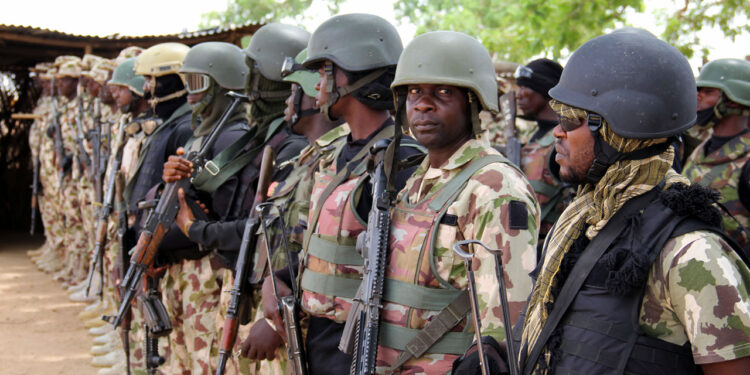Nigeria’s military has apprehended four Pakistani citizens suspected of playing critical roles in arms trafficking networks and providing specialized training to terrorist organizations operating in the country’s northeastern region.
The arrests were announced by Major General Abdulsalam Abubakar, Theatre Commander of Operation Hadin Kai, during a security briefing with defense journalists at the operational command center in Maiduguri on Wednesday.
Initial interrogations have revealed that the detained foreign nationals maintained direct connections with arms smuggling operations while simultaneously offering technical expertise and tactical instruction to established terrorist movements, including Boko Haram and the Islamic State West Africa Province.
General Abubakar emphasized how the presence of international mercenaries has dramatically intensified security challenges within the joint operations zone, describing their involvement as a significant escalation factor in regional terrorist capabilities.
“The penetration of foreign operatives into our operational territory has substantially increased the danger level posed by terrorist organizations like ISWAP and Jamaat Ahl as-Sunnah,” the military commander stated. “The recent detention of these four Pakistani individuals, whose preliminary examination indicates direct participation in arms trafficking with terrorist entities, serves as a clear indicator of this evolving threat.”
The military leader detailed how foreign involvement has transformed the operational sophistication of terrorist groups, enabling them to implement increasingly advanced combat methodologies. These enhanced capabilities include the strategic deployment of unmanned aerial vehicles for reconnaissance and offensive operations, the construction of sophisticated improvised explosive devices, and the implementation of military-grade tactical ambushes specifically designed to target security forces.
The Theatre Commander stressed the urgent necessity for comprehensive international cooperation to address the expanding challenge of transnational terrorism. He advocated for improved intelligence coordination, enhanced surveillance mechanisms, and strengthened collaborative frameworks among regional nations to effectively dismantle the support networks that facilitate these security threats.
“This concerning development demands immediate and synchronized action from the international community,” General Abubakar declared. “It’s crucial to understand that Boko Haram and Islamic State West Africa Province represent threats not merely to our military forces, but to the entire Nigerian state and its institutions.”
The military has maintained confidentiality regarding the specific identities of the arrested Pakistani nationals while comprehensive investigations continue. This operational security measure reflects standard protocol for ongoing counter-terrorism operations that may involve broader international networks.
This development highlights the increasingly complex nature of terrorism in West Africa, where local insurgent groups are receiving sophisticated support from international actors. The arrests underscore the global dimensions of regional security challenges and the critical importance of international cooperation in combating transnational terrorist networks.
The involvement of foreign nationals in providing technical expertise to local terrorist groups represents a significant evolution in the security landscape of northeastern Nigeria, potentially requiring enhanced counter-terrorism strategies and expanded international intelligence sharing agreements.



















